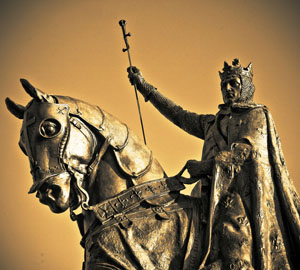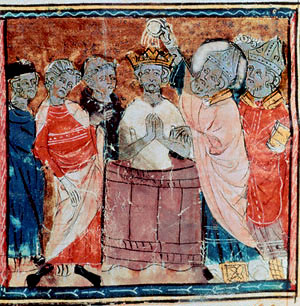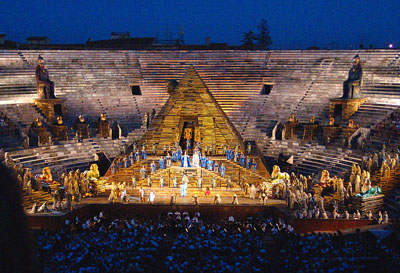 |
Organic Society
Peoples who Disappear, Peoples who Remain
Plinio Corrêa de Oliveira
The order of History is like this. For some peoples life germinates in a mysterious way, from a kind of sleepy pre-history where we can distinguish some movement here and there. At a certain moment, God touches one of these peoples and things begin to enter into order.

The myth of Crusader King, Saint Louis IX of France, endures for centuries |
In that sleepy stage such as when a child at a certain moment begins to talk, so a people starts to elaborate its own language. Just as that moment is a landmark in the child's life, so also is it in a people's pre-history. If a perceptive psychologist were to analyze the first babblings of a child, he could foresee elements of the future discourse of that person in his full maturity.
In the growth process of an adolescent, as well as that of a people, new circumstances arise and come together to develop and complete those in gestation in the phase of childhood. In the adolescent Dauphin of France, for example, one could predict the future Sun King, Louis XIV.
In the adolescence of another family, one could anticipate the head of a clan who would influence his family for three of four generations. His granddaughter, who became the mother of a family, would tell her children: "Your grandfather did not do things like that." Even though that man was dead, he would continue to govern his posterity.
Peoples called to disappear
Symmetrical to the rule by which God calls a people to life to play its role in History, there is the rule by which He makes a people disappear after that role is over. Indeed, some peoples disappear completely. In Oceania there are deserted cities that were once inhabited by peoples whose memory is completely lost. We only know that they once existed, and nothing more.
These peoples show us how ephemeral History is and how men should be turned toward God and eternity. We find the paradigm for this rule in the Flood, when God destroyed all the peoples on earth to show His power and chastise them for their infidelity and decadent behavior.
The grand moments and apogees of History are balanced by this fugacious aspect of all human affairs. This puts a brake on the pride of man and prevents him from falling into the worst evils. To give you an image of this fugacity, imagine if the pieces on a chessboard could think and consider that beyond that chessboard there is a whole world they cannot see or control. This ephemeral, fleeting aspect of History invites us to think of God, adore Him and ponder on the celestial reality we are called to eternally share after this life.
Peoples called to mark History forever
There are some peoples, however, who will mark History forever. Still others die and have resurrections. We particularly feel the hand and choice of God when He makes a people enter History or emerge from death into a post-history.

With the Baptism of Clovis, France entered the stage to play her role in History |
The emergence of a people into History happened, for instance, when God promised Abraham his descendents would be the Chosen People: The rejection or acceptance of that promise makes up in a great part the history of the Old Testament. This was also the case when He converted Clovis and his Franks: thence came the gesta Dei per Francos, the deeds of God through the Franks, which constituted a great part of the history of Christendom.
It seems that these two peoples, the Jewish and the French, either for good or for evil, will last until the end of History, for God made great promises to them. And, according to the principle taught by St. Paul (Rom 11:2), God does not revoke the promises He makes.
When Spring starts, the plants in a garden take on a new life; likewise, when God calls a people, the inter-relations of influences and dynamisms among its individuals, families, cities and regions take on a new activity and growth and they blossom. Doing this, that people marks History in its own particular way to accomplish the vocation God gave it.
The post-life of some peoples
The post-life of a people also follows some rules. At times God transforms the past of a people into a myth and legend which later fascinate other cultures and civilizations. Then, the myth itself falls asleep and that history sits on a museum shelf until the moment when a writer, poet or composer draws it out of the sarcophagus and gives it a new life.
This was what Gustave Flaubert did for the ancient Carthaginians when he wrote his successful novel Salanmbô. Salambô was a fictional daughter of the renowned general of Carthage Hamilcar Barka, the father of Hannibal. Through the picture he portrayed in that novel, the civilization of old Carthage somehow resurfaced in the 19th century.

A grandiose production of Verdi's Aida in Verona Opera House |
Another example is the myth of old Egypt that revived by means of Verdi's famous opera Aida. Following 19th century conceptions, that opera spotlighted the glory of ancient Egypt and captured the imagination of Europe. Shortly after Egypt became independent from Turkey, Khedive Ismail Pasha commissioned Verdi to write an opera for performance in 1871 to commemorate the fact. He did so, and his opera was first performed sur place (on site) at the Opera House in Cairo.
The success of Aida actually damaged the myth of the American millionaire, which was being presented then as an ideal for modern man. The North-American millionaire was depicted as practical, pragmatic, recently wealthy thanks to a railroad he built and speculations on land around it he bought for nothing and then sold for a fortune. In the imagination of the men of that time, Verdi's Aida replaced this revolutionary myth for a while.
The memories of ancient Egypt Verdi depicted with the grandiose airs of Aida's Triumphal March, the large companies of soldiers marching onstage, etc, inadvertently influenced those who saw it not to admire the successful millionaire. Aida's Triumphal March turned their admiration instead to other values, different from those of the railroad magnate. It was a metaphysical value that entered the panorama and took life in the memory of men. Even though it was transitory, that ideal slowed down the development of the revolutionary myth of the millionaire.
This is how the worlds of light and darkness develop in History, influenced by how we resurrect the memories of peoples who have already passed. This revives both the glorious and shameful ashes of the past, continuously producing effects over our own times.
Here are some considerations that may help you to understand how a historic cycle is born and how it may be analyzed.
Continued here

Posted January 20, 2012

  | | Prof. Plinio |
Organic Society was a theme dear to the late Prof. Plinio Corrêa de Oliveira. He addressed this topic on countless occasions during his life - at times in lectures for the formation of his disciples, at times in meetings with friends who gathered to study the social aspects and history of Christendom, at times just in passing.
Atila S. Guimarães selected excerpts of these lectures and conversations from the transcripts of tapes and his own personal notes. He translated and adapted them into articles for the TIA website. In these texts fidelity to the original ideas and words is kept as much as possible.

Related Topics of Interest
 Discerning the Historic Roles of Nations Discerning the Historic Roles of Nations
 Discerning the Dynamism of Individuals & Peoples Discerning the Dynamism of Individuals & Peoples
 The Sky of Lorraine and the Kingdom of Our Lord The Sky of Lorraine and the Kingdom of Our Lord
 Vocations of the European Peoples Vocations of the European Peoples
 How a Few Faithful Catholics Can Represent the Church How a Few Faithful Catholics Can Represent the Church
 The Fullness of Time The Fullness of Time
 R-CR in the Tendencies, Ideas, and Facts R-CR in the Tendencies, Ideas, and Facts

Related Works of Interest
|
|
Organic Society | Social-Political | Home | Books | CDs | Search | Contact Us | Donate

© 2002-
Tradition in Action, Inc. All Rights Reserved
|
 |
|